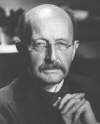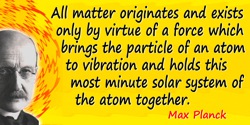 (source)
(source)
|
Max Planck
(23 Apr 1858 - 4 Oct 1947)
German theoretical physicist who introduced the quantum theory (1900), for which he was awarded the 1918 Nobel Prize for Physics. This assumes that energy is not infinitely subdivisible, but ultimately exists as discrete amounts he called quanta.
|
Max Planck Quotes on Thought (5 quotes)
>> Click for 71 Science Quotes by Max Planck
>> Click for Max Planck Quotes on | Absolute | Knowledge | Law | Nature | Research | Science | Truth |
>> Click for 71 Science Quotes by Max Planck
>> Click for Max Planck Quotes on | Absolute | Knowledge | Law | Nature | Research | Science | Truth |
Both religion and natural science require a belief in God for their activities, to the former He is the starting point, and to the latter the goal of every thought process. To the former He is the foundation, to the latter, the crown of the edifice of every generalized world view.
— Max Planck
Lecture, 'Religion and Natural Science' (1937) In Max Planck and Frank Gaynor (trans.), Scientific Autobiography and Other Papers (1949), 184.
New scientific ideas never spring from a communal body, however organized, but rather from the head of an individually inspired researcher who struggles with his problems in lonely thought and unites all his thought on one single point which is his whole world for the moment.
— Max Planck
Address on the 25th anniversary of the Kaiser-Wilhelm Gesellschaft (Jan 1936). Quoted in Surviving the Swastika: Scientific Research in Nazi Germany (1993), 97.
Those [scientists] who dislike entertaining contradictory thoughts are unlikely to enrich their science with new ideas.
— Max Planck
Attributed. (If you know a primary source, please contact webmaster.)
What led me to my science and what fascinated me from a young age was the, by no means self-evident, fact that our laws of thought agree with the regularities found in the succession of impressions we receive from the external world, that it is thus possible for the human being to gain enlightenment regarding these regularities by means of pure thought
— Max Planck
Max Planck and Ch. Scriba (ed), Wissenschaftliche Selbstbiographie (1990), 9. Quoted in Erhard Scheibe and Brigitte Falkenburg (ed), Between Rationalism and Empiricism: Selected Papers in the Philosophy of Physics (2001), 69
When the pioneer in science sets forth the groping feelers of his thought, he must have a vivid, intuitive imagination, for new ideas are not generated by deduction, but by an artistically creative imagination.
— Max Planck
In Scientific Autobiography and Other Papers (1968), 109.
See also:
- 23 Apr - short biography, births, deaths and events on date of Planck's birth.
- Where Is Science Going?, by Max Planck. - book suggestion.



 In science it often happens that scientists say, 'You know that's a really good argument; my position is mistaken,' and then they would actually change their minds and you never hear that old view from them again. They really do it. It doesn't happen as often as it should, because scientists are human and change is sometimes painful. But it happens every day. I cannot recall the last time something like that happened in politics or religion.
(1987) --
In science it often happens that scientists say, 'You know that's a really good argument; my position is mistaken,' and then they would actually change their minds and you never hear that old view from them again. They really do it. It doesn't happen as often as it should, because scientists are human and change is sometimes painful. But it happens every day. I cannot recall the last time something like that happened in politics or religion.
(1987) -- 


